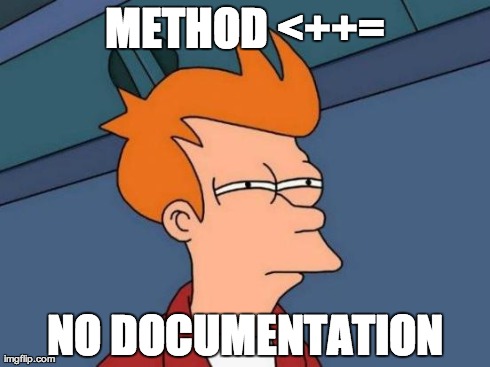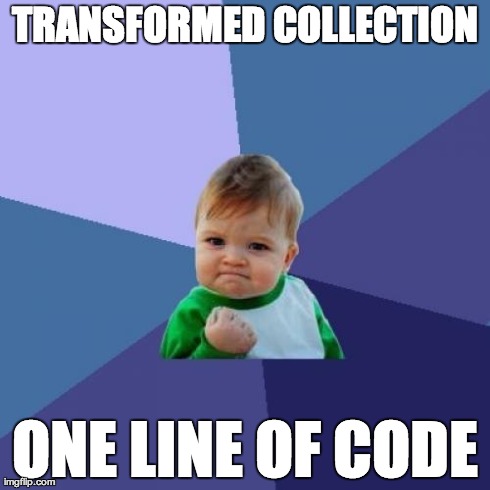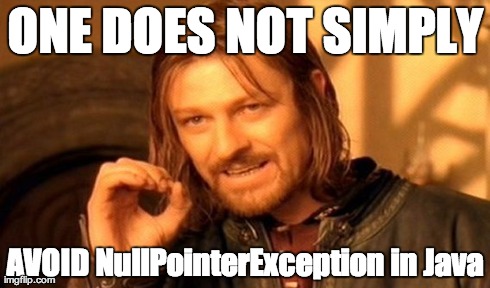THE
NET-A-PORTER
GROUP
Scala Beginner Workshop
net-a-porter.github.io/scala-beginner-workshop
What is Scala?
- OO and Functional
- Everything is an object
- Support closures
- Runs on the JVM
- Can call Java Libraries
- Statically typed
Why Scala?
- Scalable
- Codebase size
- Multi core/node friendly
- Concise and expressive
- Enjoyable to work with!
Agenda
- vals and vars
- methods
- classes and case classes
- functions
- collections and options
- traits
- objects
- implicits
vals and vars
- val (value)
- Once assigned cannot be reassigned
- var (variable)
- Can be reassigned
- Immutability first
- Use val by default
- Only use var when necessary
Examples
val title = "Jurassic Park"
val runtime = 12345
val is3d = false
val role = ("Sam Neil", "Dr. Alan Grant")
var rating = 0.8
rating = 0.9
Task
- Assign "Jaws" to a val title
- Assign 402 to a var gross
- Assign a new value to title and gross

Examples
val title: String = "Jurassic Park"
val runtime: Int = 12345
val is3d: Boolean = false
val role: (String, String) = ("Sam Neil", "Dr. Alan Grant")
var rating: Double = 0.8
rating = 0.9def (method)
def success(budget: Int, gross: Int) =
budget < gross
val r = success(100, 200)
r == true
def (method)
def success(budget: Int,
gross: Int): Boolean =
budget < gross
val r = success(100, 200)
r == true
def (method)
def success(budget: Int,
gross: Int) = {
budget < gross
}
val r = success(100, 200)
r == true
Task
- Write a method called simpleRating
- it takes a Double argument called rating
- returns Excellent when rating is greater than 8
- returns Okay when rating is between 4 and 8
- otherwise returns Poor
-
If statement Syntax:
if ( expr ) a else if( expr ) b else c - Equality check with ==
def (method)
def simpleRating(rating: Double) =
if(rating > 8.0) "Excellent"
else if(rating > 4.0) "Okay"
else "Poor"
val s = simpleRating(5.0)
s == Okay
Default Parameters
def success(budget: Int,
gross: Int = 50) =
budget < gross
val r = success(100)
r == false
val r = success(100, 200)
r == true
By Name Parameters
def success(budget: Int = 50,
gross: Int = 50) =
budget < gross
val r = success(budget = 100)
r == false
Classes
class Actor(firstName: String,
surname: String)
val tom = new Actor("Tom", "Hanks")
Classes
class Actor(firstName: String,
surname: String)
val tom = new Actor("Tom", "Hanks")
tom.name
Classes
class Actor(firstName: String,
surname: String) {
val name = firstName + " " + surname
}
val tom = new Actor("Tom", "Hanks")
p.name
Classes
class Actor(firstName: String,
surname: String) {
def name = firstName + " " + surname
}
val tom = new Actor("Tom", "Hanks")
p.name
Case Classes
case class Actor(firstName: String,
surname: String)
- + All fields made vals (public)
- + Factory method (no new keyword)
- + equals and hashcode
- + Pretty toString
- – Case-to-case class inheritance is prohibited
- + And ...
Case Class - Copy
val tom = new Actor("Tom", "Hanks")
val tom2 = tom.copy(surname = "Cruise")
tom2.surname == "Cruise"Case Class - Pattern Match
val m = Movie(certificate = "U")
val ageRequirement = p match {
case Movie("U" | "PG") => 0
case Movie("12A") => 18
case Movie(cert) => cert.toInt
}Task
- Write a case class called Movie
- With an Int constructor arg called year
- and an Int constructor arg called gross
- a Double constructor arg called rating
- and a method called badge that returns
- Golden Oldie if the year < 1960
- Blockbuster if the gross > 20 and rating > 7
- Must see otherwise
the AND operator is &&
Operators are methods
case class Actor(name: String) {
def +(other: Actor) =
Actor(name + other.name)
}
Actor("Brad").+(Actor("Angelina"))
Actor("Brad") +(Actor("Angelina"))
Actor("Brad") + Actor("Angelina")

Functions
(args) => body
val funky = (args) => bodyFunctions
val success = (budget: Int, gross: Int) =>
budget < gross
val r = success(100, 200)
val r = success.apply(100, 200)Task
case class Movie(name: String, rating: Float)
val kb = Movie("Kill Bill", rating = 8.2)
val tr = Movie("The Room", rating = 3.5)
> greatFilm(kb) == true
> greatFilm(tr) == falseWrite the function greatFilm. It checks the rating is >= 7.0
Task
val success =
(budget: Int, gross: Int) => budget < gross
val success: (Int, Int) => Boolean =
(budget, gross) => budget < gross
val success: (Int, Int) => Boolean =
_ < _Collections
- List
- think Java LinkedList
- Vector
- think Java ArrayList
- Set
- Map
Collections
val movies = List(
Movie("Jurassic Park", 10.0f),
Movie("The Room", 3.5f),
Movie("Home Alone", 7.4f)
)
movies: List[Movie] = List(Movie(...Collections
val movies =
Movie("Jurassic Park", 10.0f) ::
Movie("The Room", 3.5f) ::
Movie("Home Alone", 7.4f) :: Nil
movies: List[Movie] = List(Movie(...Collections
movies.count(greatFilm)2
movies.count(_.name.length > 10)1
Collections
movies.filter(greatFilm)List( Movie(Jurassic Park,10.0), Movie(Home Alone,7.4))
movies.filter(_.name.contains("J"))List(Movie(Jurassic Park,10.0))
Collections
movies.map(greatFilm)List(true, false, true)
movies.map(_.name)res: List[String] = List( Jurassic Park, The Room, Home Alone)
Collections
movies.collect {
case Movie(name, rating) if rating < 4 => name
}res: List[String] = List(The Room)
Collections
val actor = List("Tom", "Val", "Anthony")
val chars = List("Maverick", "Iceman", "Goose")
actor zip charsres15: List[(String, String)] = List( (Tom,Maverick), (Val,Iceman), (Anthony,Goose))

Task
case class Movie(genre: String, gross: Int)
val movies = (100 to 5000 by 50).flatMap(g =>
Movie("Drama", g) :: Movie("Romcom", g) ::
Movie("Action", g) :: Nil)
- Work out the total gross of all the "Action"
movies - Answer should be 252450
You can call .sum on a List[Int] to get a total
Some answers
val res = movies.
filter(_.genre == "Action").
map(_.gross).
sum
val res = movies.collect {
case Movie("Action", gross) => gross
}.sumFunctions again
movies.map (movie =>
if(movie.score < 4) "Flop"
else "Blockbuster"
)
movies.collect {
case movie if movie.score < 4 => "Flop"
}Functions again
movies.map (movie =>
if(movie.score < 4) "Flop"
else "Blockbuster"
)
movies.collect {
case movie if movie.score < 4 => "Flop"
case _ => "Blockbuster"
}Functions again
movies.map (movie =>
if(movie.score < 4) "Flop"
else "Blockbuster"
)
movies.map {
case movie if movie.score < 4 => "Flop"
case _ => "Blockbuster"
}Partial Functions
- Partial functions only take one argument (unary)
- Doesn’t have to handle all possible values
val f: Int => String = {
case 0 => "zero!"
case 1 => "one!"
}What happens if we call this with the argument 3?
Options
- The
Option[T]type is used to represent optional data - Two sub classes
case class Some(val x)case object None

Options
val sort = Some("newest")
val sort = None
val sort = Option("newest")
val sort = Option(null)Options
val sort: Option[String] = …
sort.getOrElse("newest")Options
val querySort: Option[String] = …
val headerSort: Option[String] = …
> val token = querySort.orElse(headerSort)
Some("newest")Options
val sort: Option[String] = …
val movies = sort
.map(sort => getMoviesFromDb(sort))
page = Some(List(Movie(...), Movie(...)))
page = NoneTask
- Make a case class Rating
- It has a stars field of type Int
- and a comment field of type Option[String]
- Give Rating a method asString that returns like so:
Rating(3, None).asString
"5* [no comment]"
Rating(1, Some("So awful")).asString
"1* [comment: So awful]"Some Solutions
def asString =
stars + "* " +
comment.map("[comment:" + _ + "]").
getOrElse("[no comment]")
def asString =
stars + "* " + (
if(comment.nonEmpty) "[comment:" + comment.get + "]"
else "[no comment]")
def asString = stars + "* " + (comment match {
case Some(c) => s"[comment:$c]"
case None => "[no comment]"
})
Callback Hell
val spielbergCast = movies.collect {
case Movie("Spielberg", cast) =>
cast.map(_.name)
}
.flatten
For Expressions
val spielbergCast = for {
movie <- movies
if movie.director.name == "Spielberg"
actor <- movie.cast
} yield actor.name
Traits
- Like Classes but
- No constructor
- Can do multiple inheritance
Traits
case class Award(name: String,
outcome: String)
// outcome is "Won" or "Nominated"
trait Person {
def awards: List[Award]
def awardsWon =
prods.filter(_.outcome == "Won")
}Traits
case class Actor(awards: List[Award])
extends Person
val seanBean = Actor(
Award("Best Lead Actor", "Won") :: Nil
)
seanBean.awardsWon.size == 1Traits
case class Director(awards: List[Award])
val spielberg = new Director(
Award("Best Film", "Won") :: Nil
) with Person
spielberg.awardsWon.size == 0Traits
- Define a trait called
Productionwith and abstract defreleaseYearof typeInt - Define a
Filmclass; extends Production implement releaseYear with a year val - Bonus: Change
TvShowto extends Production - implement releaseYear with a method selecting the earliest series year
case class Series(year: Int)
case class TvShow(series: List[Series])
Traits
trait Production { def releaseYear: Int }
case class Film(releaseYear: Int) extends Production
case class TvShow(series: List[Series]) {
def releaseYear = series.sortBy(_.year).head.year
}
val thirtyRock = new TvShow(
Series(2011) :: Series(2012) :: Nil
) with Production
thirtyRock.releaseYear
res2: Int = 2011
Objects
object Counties {
val countries = "GB" :: "ZH" :: Nil
def supported(c: String) =
countries.contains(c)
}
> Countries.supported("ZH")
> trueObjects
case class Movie(name: String)
object Movie {
def apply(name: String) =
new Movie(name)
}
> Movie("Jurassic Park")Objects as enums
sealed trait Outcome
case object Nominated extends Outcome
case object Won extends OutcomeObjects as enums
case class Award(outcome: Outcome)
val award = Award(Won)
val msg = award match {
case Award(Won) => "Woohoo!"
case Award(_) => "Unlucky"
}Implicits
- The
implicitkeyword can be used: - On a class/method - implicit conversions
- On a
val- implicit parameters
Implicit conversions
case class HttpRequest (
headers: List[HttpHeader]
)
case class HttpHeader (
name: String, value: String
)Implicit conversions
implicit class PimpedHttpRequest(r: HttpRequest) {
def headerValue(name: String) =
r.headers.find(_.name == name)
}
val request = HttpRequest(…)
request.headerValue("page")
// Compiler generates
// PimpedHttpRequest(request).headerValue("page")Task
case class Duration(mins: Int, secs: Int)
- Pimp Duration so it has a totalSecs method
- it should return the time in seconds for the duration
Duration(1, 30).totalSecs == 90An Answer
implicit class PimpedDuration(d: Duration) {
def totalSecs = d.mins * 60 + d.secs
}
Duration(1, 30).totalSecs == 90Implicit Parameters
Seq(22, 2, 11, 1).sorted
// Seq(1, 2, 11, 22)
Seq("22", "2", "11", "1").sorted
// Seq(1, 11, 2, 22)Implicit Parameters
trait Seq[A] {
def sorted[A](implicit ord: Ordering[A]): Seq[A]
}Implicit Parameters
case class Film(year: Int)
implicit val filmOrd = new Ordering[Film] {
def compare(x: Film, y: Film) =
x.year.compareTo(y.year)
}
val films = Seq(Film(2011), Film(1960), Film(1994))
films.sorted
// List(Film(1960), Film(1994), Film(2011))
Implicit Parameters
trait Seq[A] {
def sorted[A](asc: Boolean)
(implicit ord: Ordering[A]): Seq[A]
}
val films = Seq(Film(2011), Film(1960), Film(1994))
films.sorted(false)
Implicit Parameters
implicit val movieOrd = new Ordering[Film] {
def compare(x: Film, y: Film) =
x.year.compareTo(y.year)
}
implicit object FilmOrd extends Ordering[Film] {
def compare(x: Film, y: Film) =
x.year.compareTo(y.year)
}
Other topics
- lazy vals
- Type Aliases
- Structural Types (duck typing)
- Currying
- Value Class
- String Interpolation
- Either / Try
- Type Classes / The Magnet Pattern
- Generic Types - covariant / contravariant
- for comprehensions
- Nested methods
- Macros